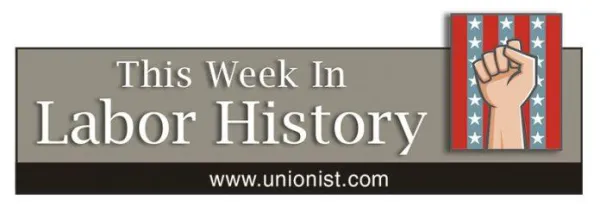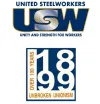This week in labor history: October 17-23

OCTOBER 17
1814 – A huge vat ruptures at a London brewery, setting off a domino effect of similar ruptures and what was to become known as The London Beer Flood. Nearly 1.5 million liters of beer gushed into the streets drowning or otherwise causing the deaths of eight people, mostly poor people living in nearby basements.
1932 – Founding of the American Federation of Government Employees, following a decision by the National Federation of Federal Employees (later to become part of the Int’l Association of Machinists) to leave the AFL.
1939 – Labor activist Warren Billings is released from California’s Folsom Prison. Along with Thomas J. Mooney, Billings had been pardoned for a 1916 conviction stemming from a bomb explosion during a San Francisco Preparedness Day parade. He had always maintained his innocence.
1950 – “Salt of the Earth” strike begins by the mostly Mexican-American members of Mine, Mill and Smelter Workers Union Local 890 in Bayard, N.M. Strikers’ wives walked picket lines for seven months when their husbands were enjoined during the 14-month strike against the New Jersey Zinc Co. A great movie, see it!
OCTOBER 18
1648 – The “Shoemakers of Boston” – the first Labor organization in what would later become the United States – was authorized by the Massachusetts Bay Colony.
1911 – New York City agrees to pay women schoolteachers a rate equal to that of men.
1927 – IWW Colorado Mine strike; first time all coal fields are out.
1939 – Some 58,000 Chrysler Corp. workers strike for wage increases.
1943 – The United Packinghouse Workers of America (UPWA) was formed as a self-governing union, an outgrowth of the CIO’s Packinghouse Workers Organizing Committee. UPWA merged with the Meatcutters Union in 1968, which merged with the Retail Clerks in 1979 to form the United Food and Commercial Workers (UFCW).
1983 – GM agrees to hire more women and minorities for five years as part of a settlement with the Equal Employment Opportunity Commission.
OCTOBER 19
1949 – The National Association of Letter Carriers achieves equalization of wages for all letter carriers, meaning city delivery carriers began receiving the same wages regardless of the size of the community in which they worked.
1980 – The J.P. Stevens textile company is forced to sign its first union contract after a 17-year struggle in North Carolina and other southern states.
OCTOBER 20
1926 – Eugene V. Debs, U.S. Labor leader and socialist, dies in Elmhurst, Ill. Among his radical ideas: an eight-hour workday, pensions, workman’s compensation, sick leave and social security. He ran for president from a jail cell in 1920 and got a million votes.
1947 – Hollywood came under scrutiny as the House Un-American Activities Committee (HUAC) opened hearings into alleged Communist influence within the motion picture industry. Dozens of union members were among those blacklisted as a result of HUAC’s activities.
1980 – Presidential candidate Ronald Reagan writes to PATCO President Robert Poli with this promise: if the union endorses Reagan, “I will take whatever steps are necessary to provide our air traffic controllers with the most modern equipment available and to adjust staff levels and work days so that they are commensurate with achieving a maximum degree of public safety.” He got the endorsement. Nine months after the election, he fires the air traffic controllers for engaging in an illegal walkout over staffing levels and working conditions.
2013 – Two track workers are killed in a (San Francisco) Bay Area Rapid Transit train accident. Federal investigators said the train was run by a BART employee who was being trained as an operator as members of the Amalgamated Transit Union were participating in what was to be a four-day strike.
OCTOBER 21
1933 – Wisconsin dairy farmers begin their third strike of the year in an attempt to raise the price of milk paid to producers during the Great Depression. Several creameries were bombed before the strike ended a month later. The economy eventually improved, allowing the farmers to make more money.
OCTOBER 22
1934 – Bank robber Charles Arthur “Pretty Boy” Floyd is killed by FBI agents near East Liverpool, Ohio. He was a hero to the people of Oklahoma who saw him as a “Sagebrush Robin Hood,” stealing from banks and sharing some of the proceeds with the poor.
OCTOBER 23
1902 – President Theodore Roosevelt establishes a fact-finding commission that suspends a nine-months-long strike by Western Pennsylvania coal miners fighting for better pay, shorter workdays and union recognition. The strikers ended up winning more pay for fewer hours, but failed to get union recognition. It was the first time that the federal government had intervened as a neutral arbitrator in a Labor dispute.
1989 – Explosion and fire at Phillips Petroleum refinery in Pasadena, Texas, kills 23 and injures 314.
2001 – Postal workers Joseph Curseen and Thomas Morris die nearly a month after having inhaled anthrax at the Brentwood mail sorting center in Washington, D.C. Other postal workers had been made ill but survived. Letters containing the deadly spores had been addressed to U.S. Senate offices and media outlets.
(Compiled by David Prosten, founder of Union Communication Services)
